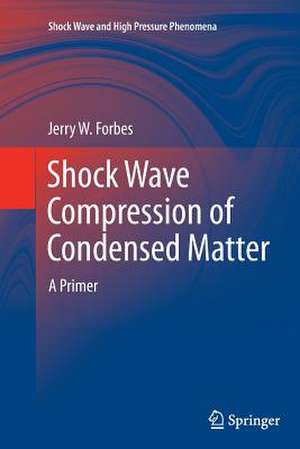Shock Wave Compression of Condensed Matter: A Primer: Shock Wave and High Pressure Phenomena
Autor Jerry W. Forbesen Limba Engleză Paperback – 7 mar 2015
| Toate formatele și edițiile | Preț | Express |
|---|---|---|
| Paperback (1) | 532.38 lei 6-8 săpt. | |
| Springer Berlin, Heidelberg – 7 mar 2015 | 532.38 lei 6-8 săpt. | |
| Hardback (1) | 706.63 lei 6-8 săpt. | |
| Springer Berlin, Heidelberg – 2 feb 2013 | 706.63 lei 6-8 săpt. |
Din seria Shock Wave and High Pressure Phenomena
- 15%
 Preț: 651.67 lei
Preț: 651.67 lei - 24%
 Preț: 804.04 lei
Preț: 804.04 lei - 18%
 Preț: 2099.77 lei
Preț: 2099.77 lei - 18%
 Preț: 1111.97 lei
Preț: 1111.97 lei - 15%
 Preț: 645.28 lei
Preț: 645.28 lei - 18%
 Preț: 948.29 lei
Preț: 948.29 lei - 18%
 Preț: 1235.25 lei
Preț: 1235.25 lei - 18%
 Preț: 1132.65 lei
Preț: 1132.65 lei - 18%
 Preț: 1228.96 lei
Preț: 1228.96 lei -
 Preț: 397.01 lei
Preț: 397.01 lei - 18%
 Preț: 949.10 lei
Preț: 949.10 lei - 15%
 Preț: 634.32 lei
Preț: 634.32 lei - 18%
 Preț: 1541.47 lei
Preț: 1541.47 lei - 24%
 Preț: 1040.57 lei
Preț: 1040.57 lei - 15%
 Preț: 642.03 lei
Preț: 642.03 lei - 18%
 Preț: 892.90 lei
Preț: 892.90 lei - 20%
 Preț: 560.55 lei
Preț: 560.55 lei - 18%
 Preț: 1390.73 lei
Preț: 1390.73 lei - 18%
 Preț: 947.50 lei
Preț: 947.50 lei - 18%
 Preț: 957.44 lei
Preț: 957.44 lei - 18%
 Preț: 1126.69 lei
Preț: 1126.69 lei -
 Preț: 384.70 lei
Preț: 384.70 lei - 15%
 Preț: 649.39 lei
Preț: 649.39 lei - 18%
 Preț: 1382.21 lei
Preț: 1382.21 lei -
 Preț: 392.21 lei
Preț: 392.21 lei - 15%
 Preț: 596.36 lei
Preț: 596.36 lei - 18%
 Preț: 1554.72 lei
Preț: 1554.72 lei - 18%
 Preț: 1228.29 lei
Preț: 1228.29 lei - 15%
 Preț: 644.30 lei
Preț: 644.30 lei - 18%
 Preț: 891.80 lei
Preț: 891.80 lei - 18%
 Preț: 951.14 lei
Preț: 951.14 lei - 15%
 Preț: 534.82 lei
Preț: 534.82 lei -
 Preț: 391.79 lei
Preț: 391.79 lei
Preț: 532.38 lei
Preț vechi: 626.33 lei
-15% Nou
Puncte Express: 799
Preț estimativ în valută:
101.88€ • 105.98$ • 84.11£
101.88€ • 105.98$ • 84.11£
Carte tipărită la comandă
Livrare economică 15-29 aprilie
Preluare comenzi: 021 569.72.76
Specificații
ISBN-13: 9783642445996
ISBN-10: 3642445993
Pagini: 396
Ilustrații: XIV, 374 p. 211 illus., 11 illus. in color.
Dimensiuni: 155 x 235 x 21 mm
Greutate: 0.55 kg
Ediția:2012
Editura: Springer Berlin, Heidelberg
Colecția Springer
Seria Shock Wave and High Pressure Phenomena
Locul publicării:Berlin, Heidelberg, Germany
ISBN-10: 3642445993
Pagini: 396
Ilustrații: XIV, 374 p. 211 illus., 11 illus. in color.
Dimensiuni: 155 x 235 x 21 mm
Greutate: 0.55 kg
Ediția:2012
Editura: Springer Berlin, Heidelberg
Colecția Springer
Seria Shock Wave and High Pressure Phenomena
Locul publicării:Berlin, Heidelberg, Germany
Cuprins
Introduction of Shock Wave Physics of Condensed Matter.- Plane One-Dimensional Shock Waves.- Impedance Matching Technique.- Experimental Techniques.- Thermodynamics of Shock Waves.- Solids.- Differential Conservation Equations and Time-dependent Flow.- First-order Polymorphic and Melting Phase Transitions Under Shock Loading.- Secondary Ideal High Explosives, Non-steady Initiation Process, and Steady Detonation Wave Models.- Steady Detonation Waves in Right Circular Cylinders of Non-ideal Explosives.- Special Topics: Lagrangian Coordinates, Spall, and Radiation Induced Shocks.- Appendices.
Recenzii
This is a terrific new book on shock compression science from one of the top researchers in the field. I have worked with shock waves for a number of years, but I was not formally trained in the area. What makes this book special is the emphasis on explaining the fundamentals in an extremely clear and logical fashion. […] This book has also been a gift to my students, who bought the Kindle edition and finally have a reference that is fun to read and tremendously instructive. I think that experts in the field can appreciate and enjoy this book and its perceptive insights, and for newcomers it is a positive must have.
Dana D. Dlott , William H. and Janet G. Lycan Professor of Chemistry, University of Illinois / http://www.etcmd.com/pages/book-sh.php
This book provides a fantastic introduction to the nuts and bolts of shock compression of materials and will be a canonical reference for neophytes and experts alike. There is a pressing need for a treatment of this subject that can be handed to a new student to get him/her up to speed; Forbes has provided that book. […] I discovered that this book is available electronically through my institution's library; pdf versions of the chapters can be downloaded individually making for easy distribution to my group members.
Evan Reed, Assistant Professor, Department of Materials Science and Engineering, Stanford University / http://www.etcmd.com/pages/book-sh.php
The recently published book "Shock Compression of Condensed Matter" by Dr. Jerry Forbes is an excellent comprehensive teaching and research summary of the various fields that apply shock waves to many different types of solids and liquids. While most teaching texts do not include modern experimental and theoretical techniques and most topical research texts do not contain sufficient background information, this book presents both in a clear, well-organized manner. The author combined lessons learned during several years of teaching shock wave compression courses and many years of state-of-the-art experimental research to create this unique book. […]
Craig M. Tarver, Energetic Materials Center, Lawrence Livermore National Laboratory / http://www.etcmd.com/pages/book-sh.php
Dana D. Dlott , William H. and Janet G. Lycan Professor of Chemistry, University of Illinois / http://www.etcmd.com/pages/book-sh.php
This book provides a fantastic introduction to the nuts and bolts of shock compression of materials and will be a canonical reference for neophytes and experts alike. There is a pressing need for a treatment of this subject that can be handed to a new student to get him/her up to speed; Forbes has provided that book. […] I discovered that this book is available electronically through my institution's library; pdf versions of the chapters can be downloaded individually making for easy distribution to my group members.
Evan Reed, Assistant Professor, Department of Materials Science and Engineering, Stanford University / http://www.etcmd.com/pages/book-sh.php
The recently published book "Shock Compression of Condensed Matter" by Dr. Jerry Forbes is an excellent comprehensive teaching and research summary of the various fields that apply shock waves to many different types of solids and liquids. While most teaching texts do not include modern experimental and theoretical techniques and most topical research texts do not contain sufficient background information, this book presents both in a clear, well-organized manner. The author combined lessons learned during several years of teaching shock wave compression courses and many years of state-of-the-art experimental research to create this unique book. […]
Craig M. Tarver, Energetic Materials Center, Lawrence Livermore National Laboratory / http://www.etcmd.com/pages/book-sh.php
Textul de pe ultima copertă
This book introduces the core concepts of the shock wave physics of condensed matter, taking a continuum mechanics approach to examine liquids and isotropic solids. The text primarily focuses on one-dimensional uniaxial compression in order to show the key features of condensed matter’s response to shock wave loading. The first four chapters are specifically designed to quickly familiarize physical scientists and engineers with how shock waves interact with other shock waves or material boundaries, as well as to allow readers to better understand shock wave literature, use basic data analysis techniques, and design simple 1-D shock wave experiments. This is achieved by first presenting the steady one-dimensional strain conservation laws using shock wave impedance matching, which insures conservation of mass, momentum and energy. Here, the initial emphasis is on the meaning of shock wave and mass velocities in a laboratory coordinate system. An overview of basic experimental techniques for measuring pressure, shock velocity, mass velocity, compression and internal energy of steady 1-D shock waves is then presented. In the second part of the book, more advanced topics are progressively introduced: thermodynamic surfaces are used to describe equilibrium flow behavior, first-order Maxwell solid models are used to describe time-dependent flow behavior, descriptions of detonation shock waves in ideal and non-ideal explosives are provided, and lastly, a select group of current issues in shock wave physics are discussed in the final chapter.
Caracteristici
Provides the reader with the basic knowledge required to conduct simple experiments and to understand the more specialized literature Text based on 15 years teaching experience Contains many end-of-chapter exercises Includes supplementary material: sn.pub/extras Includes supplementary material: sn.pub/extras





